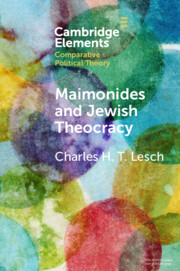Element contents
Maimonides and Jewish Theocracy
Published online by Cambridge University Press: 26 November 2024
Summary
- Type
- Element
- Information
- Online ISBN: 9781108884051Publisher: Cambridge University PressPrint publication: 19 December 2024
Bibliography
Bibliography
1 Samuel.
- 3
- Cited by

